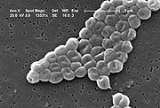
Pseudomonadales
Encyclopedia
The Pseudomonadales are an order of Proteobacteria
. A few members are opportunistic pathogens, such as species of Pseudomonas
, Moraxella
, and Acinetobacter
, which may cause pneumonia
.
includes the opportunistic human pathogen P. aeruginosa
, plant pathogenic bacteria, plant beneficial bacteria, ubiquitous soil bacteria with bioremediation capabilities and other species that cause spoilage of milk and dairy products. P. aeruginosa can cause chronic opportunistic infections that have become increasingly apparent in immunocompromised patients and the ageing population of industrialised societies. The genome sequences of several pseudomonads have become available in recent years and researchers are beginning to use the data to make new discoveries about this bacterium.
is a group of Gram-negative, non-motile and non-fermentative bacteria belonging to the family Moraxellaceae. They are important soil organisms where they contribute to the mineralisation of, for example, aromatic compounds. Acinetobacter are able to survive on various surfaces (both moist and dry) in the hospital environment, thereby being an important source of infection in debilitated patients. These bacteria are innately resistant to many classes of antibiotic
s. In addition, Acinetobacter is uniquely suited to exploitation for biotechnological purposes.
Proteobacteria
The Proteobacteria are a major group of bacteria. They include a wide variety of pathogens, such as Escherichia, Salmonella, Vibrio, Helicobacter, and many other notable genera....
. A few members are opportunistic pathogens, such as species of Pseudomonas
Pseudomonas
Pseudomonas is a genus of gammaproteobacteria, belonging to the family Pseudomonadaceae containing 191 validly described species.Recently, 16S rRNA sequence analysis has redefined the taxonomy of many bacterial species. As a result, the genus Pseudomonas includes strains formerly classified in the...
, Moraxella
Moraxella
Moraxella is a genus of Gram-negative bacteria in the Moraxellaceae family. It is named after the Swiss ophthalmologist Victor Morax. The organisms are short rods, coccobacilli or, as in the case of Moraxella catarrhalis, diplococci in morphology, with asaccharolytic, oxidase-positive and...
, and Acinetobacter
Acinetobacter
Acinetobacter [asz−in−ée−toe–back−ter] is a genus of Gram-negative bacteria belonging to the Gammaproteobacteria. Acinetobacter species are non-motile and oxidase-negative, and occur in pairs under magnification....
, which may cause pneumonia
Pneumonia
Pneumonia is an inflammatory condition of the lung—especially affecting the microscopic air sacs —associated with fever, chest symptoms, and a lack of air space on a chest X-ray. Pneumonia is typically caused by an infection but there are a number of other causes...
.
Pseudomonas
The bacterial genus PseudomonasPseudomonas
Pseudomonas is a genus of gammaproteobacteria, belonging to the family Pseudomonadaceae containing 191 validly described species.Recently, 16S rRNA sequence analysis has redefined the taxonomy of many bacterial species. As a result, the genus Pseudomonas includes strains formerly classified in the...
includes the opportunistic human pathogen P. aeruginosa
Pseudomonas aeruginosa
Pseudomonas aeruginosa is a common bacterium that can cause disease in animals, including humans. It is found in soil, water, skin flora, and most man-made environments throughout the world. It thrives not only in normal atmospheres, but also in hypoxic atmospheres, and has, thus, colonized many...
, plant pathogenic bacteria, plant beneficial bacteria, ubiquitous soil bacteria with bioremediation capabilities and other species that cause spoilage of milk and dairy products. P. aeruginosa can cause chronic opportunistic infections that have become increasingly apparent in immunocompromised patients and the ageing population of industrialised societies. The genome sequences of several pseudomonads have become available in recent years and researchers are beginning to use the data to make new discoveries about this bacterium.
Acinetobacter
The genus AcinetobacterAcinetobacter
Acinetobacter [asz−in−ée−toe–back−ter] is a genus of Gram-negative bacteria belonging to the Gammaproteobacteria. Acinetobacter species are non-motile and oxidase-negative, and occur in pairs under magnification....
is a group of Gram-negative, non-motile and non-fermentative bacteria belonging to the family Moraxellaceae. They are important soil organisms where they contribute to the mineralisation of, for example, aromatic compounds. Acinetobacter are able to survive on various surfaces (both moist and dry) in the hospital environment, thereby being an important source of infection in debilitated patients. These bacteria are innately resistant to many classes of antibiotic
Antibiotic
An antibacterial is a compound or substance that kills or slows down the growth of bacteria.The term is often used synonymously with the term antibiotic; today, however, with increased knowledge of the causative agents of various infectious diseases, antibiotic has come to denote a broader range of...
s. In addition, Acinetobacter is uniquely suited to exploitation for biotechnological purposes.

